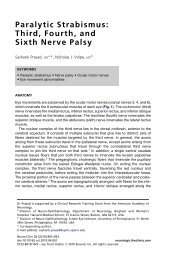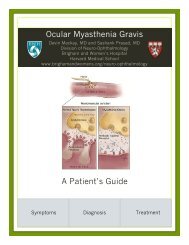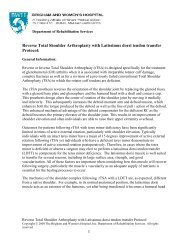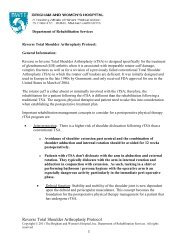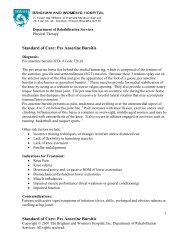Enjoying Your Pregnancy Guide to Understanding - Brigham and ...
Enjoying Your Pregnancy Guide to Understanding - Brigham and ...
Enjoying Your Pregnancy Guide to Understanding - Brigham and ...
You also want an ePaper? Increase the reach of your titles
YUMPU automatically turns print PDFs into web optimized ePapers that Google loves.
30<br />
<strong>Your</strong> Prenatal <strong>Guide</strong><br />
HEPATITIS C<br />
Hepatitis C is a viral hepatitis that is spread through blood contact, including organ transplantation, intravenous<br />
drug use <strong>and</strong> blood transfusion. It can also be spread through sexual relations <strong>and</strong> from an infected mother <strong>to</strong> her child<br />
during birth. Most cases of hepatitis C are mild, <strong>and</strong> many go undiagnosed. However, a large percentage of people who<br />
have been exposed <strong>to</strong> hepatitis C can develop chronic infection that can cause symp<strong>to</strong>ms many years later. It may also<br />
be transmitted <strong>to</strong> other people. If you have ever had unexplained hepatitis or jaundice, received blood transfusions or<br />
underwent organ transplant prior <strong>to</strong> 1993, used intravenous drugs, or had a sexual partner with these issues, please<br />
inform your obstetric care provider. You <strong>and</strong> your baby may benefit from testing for hepatitis C.<br />
CHICKENPOX (VARICELLA)<br />
Many women have already had chickenpox during their childhood. That’s why the disease is so uncommon during<br />
adulthood. It is however likely <strong>to</strong> be more severe in adults <strong>and</strong> pregnant women who do get it.<br />
If you are exposed <strong>to</strong> chickenpox <strong>and</strong> are not sure you have had it, contact us immediately. A simple blood test can<br />
establish your immunity. If you are non-immune <strong>and</strong> the exposure occurred less than 96 hours ago, an injection of<br />
varicella-zoster immune globulin (VZIG) can be given that can prevent or modify the disease. If you become infected<br />
at or near the time of delivery, your baby will get a special immune globulin injection <strong>to</strong> prevent him/her from getting<br />
a serious infection.<br />
INFLUENZA (FLU)<br />
If a pregnant woman gets the flu, she is more likely <strong>to</strong> become very sick. We will consider giving you a vaccination<br />
if certain medical conditions or seasonal considerations put you at increased risk for infection.<br />
HIV/HUMAN IMMUNODEFICIENCY VIRUS<br />
HIV is a sexually transmitted infection which causes AIDS. HIV (the AIDS virus) is transmitted by having any type<br />
of sex without a condom, <strong>and</strong> by sharing needles, for example when using intravenous drugs. Also, a pregnant woman<br />
can transmit HIV <strong>to</strong> her baby during pregnancy or by breastfeeding.<br />
There are now medicines available <strong>to</strong> an HIV-infected pregnant woman <strong>to</strong> decrease the chances that the infection will<br />
be passed on <strong>to</strong> her baby during pregnancy or at the time of birth. The sooner HIV is diagnosed <strong>and</strong><br />
treatment is started, the better chance both mother <strong>and</strong> baby will have of staying healthy.<br />
Studies have shown that many women with HIV do not even know they could be infected.<br />
A simple blood test is available <strong>to</strong> see if you have been exposed <strong>to</strong> HIV. Since people may<br />
have the virus for many years <strong>and</strong> not know it, it is important that all pregnant women be<br />
tested. This test is recommended whether or not you think you have been exposed.<br />
Knowing if you have HIV is very important <strong>to</strong> your health <strong>and</strong> that of your unborn<br />
baby. The test is confidential <strong>and</strong> requires your consent. It can be performed along<br />
with other routine tests obtained during your pregnancy. Please discuss this test<br />
with your health care provider.<br />
CYTOMEGALOVIRUS (CMV)<br />
This is the most common viral infection that affects the newborn infant. If you become infected you’ll experience a<br />
nonspecific illness characterized by sore throat, fever, <strong>and</strong> swollen gl<strong>and</strong>s or you may have no symp<strong>to</strong>ms at all. Because<br />
of its trivial nature it’s rarely recognized. This virus can remain in healthy adults for a lifetime <strong>and</strong> periodically become<br />
active. When active, the virus can cross the placenta <strong>to</strong> your unborn baby <strong>and</strong> cause physical impairments at birth.<br />
It appears that a baby is at greatest risk if the mother becomes infected for the first time during her pregnancy. Risk<br />
<strong>to</strong> the baby is not nearly so great if the mother experiences a flare up during pregnancy from a previously acquired<br />
infection. Fortunately, those infants born <strong>to</strong> mothers who have the most severe form of infection only rarely develop<br />
the serious consequences of the disease in the newborn period.<br />
Currently there is no effective treatment available for either the pregnant mother or her newborn baby <strong>and</strong> the<br />
majority of maternal infections are not easily diagnosed. Pregnant women may reduce exposure by careful<br />
h<strong>and</strong>washing <strong>and</strong> hygiene practices.<br />
MUMPS<br />
Mumps is uncommon during pregnancy because of the childhood vaccine <strong>and</strong> low infection rate in susceptible<br />
adults. However, it does appear <strong>to</strong> increase the rate of miscarriages <strong>and</strong> premature labor. Newborns rarely have<br />
abnormalities just because their mothers had the mumps during pregnancy.



